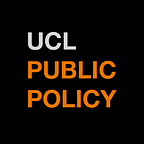Scientifically Illiterate vs Politically Clueless?
Wisdom Shall Prevail
By Professor Chris Rapley CBE
“We’ve arranged a global civilization in which most crucial elements profoundly depend on science and technology. We have also arranged things so that almost no one understands science and technology. This is a prescription for disaster. We might get away with it for a while, but sooner or later this combustible mixture of ignorance and power is going to blow up in our faces.”
Carl Sagan, The Demon-Haunted World: Science as a Candle in the Dark
Viewed from COVID-19 lockdown, Carl Sagan’s quote is prophetic. The threat of a global pandemic has been top of the UK National Risk Register since it was first published in 2008. The measures necessary to achieve a degree of societal resilience were also well known. But ideological dogma and political expediency prevailed, and here we are — experiencing a humanitarian catastrophe of immense dimensions, in which the UK’s performance is one of the worst.
How could the warnings have been ignored?
Sagan’s observation is germane. For many people, a lack of understanding of the scientific process leads to the conclusion that advice from scientists amounts to no more than another form of opinion.
Equally unhelpful is the tendency in political circles to adopt the “Peter Pan” approach to policy and decision-making, in which wishing hard enough will bring about the desired outcome, even if it violates the Laws of Nature.
Arguably a powerful third factor is political naiveté amongst many scientists, whose motivation is to ‘answer the question’, often disregarding real world practicalities.
The truth is that scientific advice can — and should — illuminate political decision making. But it cannot — and should not — arbitrate the decision. Science contributes to the process alongside a host of other considerations — technical, economic, legal, political, psychological, ethical, spiritual and pragmatic — all of which necessarily influence the outcome.
Churchill during WWII famously recognised this in his declaration that he wanted his scientists “on tap, not on top”.
So where does this leave us?
Would it help if more scientists became politicians? Possibly. Angela Merkel, a leader capable of understanding reality through the lenses of politics and science, provides an encouraging example. But even if the proposition could be made attractive to academics, it would take a while before a sufficient scientific presence in politics could hope to make itself felt.
In the meantime we have COVID to address — and creeping yet even more threatening issues such as climate change, biodiversity loss, and the general damages we are inflicting on the natural world — our life support system.
Lessons learned
What does the (mis)handling of communication about the science advice the UK Government received on COVID, and the inevitable backlash, have to teach us about the future crises we face? And what lessons can the climate science community in particular learn from the sudden resurgence of a very public reliance on science advice?
This is not the first time the science underpinning political decision making has been pushed into the limelight. The research community should keep in mind lessons from ‘climategate’ a decade ago, which showed how public trust in science can be undermined if there is the political will to discredit it.
More so than ever the need to be rigorous, robust, transparent and reproducible in the underlying science, as well as being clear, concise and open (especially about uncertainty) in its communication, are paramount to gaining public trust and political traction.
There are deeper problems. Insights from neuroscience tell us that humans have inherent difficulties in evaluating risk. Furthermore, groups of individuals who recognise and wish to address a problem, often misunderstand the experts who have the knowledge and insights that they need. Issues of language and ways of thinking result in an unrecognised disconnect, which compromises their interaction.
At UCL we have developed a methodology to address that gulf. We are pursuing an initiative to expand our capacity to accelerate the scale and pace of climate action. Our goal is to facilitate new forms of practice, informed by insight and understanding, to surmount the barriers that currently inhibit creative discourse amongst expert communities.
The need is great. At heart, we seek to replace illiteracy and cluelessness with wise and effective agency. A candle will not be sufficient, we need a floodlight.
_______________________________________________________________
More about the author
Professor Chris Rapley is Professor of Climate Science at UCL. He is the Chair of the UCL Policy Commission on the Communication of Climate Science, Patron of the Surrey Climate Commission, a Science Advisory Board member to the Science Museum Group, an Advisory Board member to the newly established UK Clean Growth Fund, and a Science Committee member of the NASA-ESA Frontier Development Lab. He was the Science Advisor on the highly influential BBC-1 documentary “Climate Change — The Facts” narrated by Sir David Attenborough.
